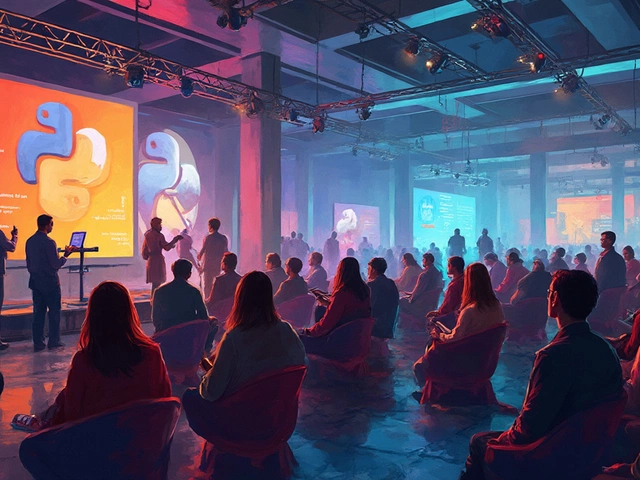In today's world, knowing how to code can transform your job prospects, and not just in the tech industry. As technology evolves, coding has become a fundamental skill across various fields where innovation and efficiency are paramount. People are learning to code not only to become software developers but also to step into other exciting career paths where programming languages are essential.
If you think coding is just for tech geeks sitting in front of screens all day, think again. Coding skills play a crucial role in numerous jobs, from creative arts to data science. As we dive into the different careers that benefit from coding expertise, you'll discover how they shape both the present and the future.
- Understanding Coding and Its Applications
- Technology and Software Development
- Creative and Digital Design Fields
- Coding in Scientific and Data Analysis Roles
Understanding Coding and Its Applications
Coding, at its core, is the language we use to communicate with computers. It's the process of designing and building executable programs to achieve specific outcomes. This skill is highly valued in today's digital age, making it essential for those looking to advance in their careers. There are many programming languages, each suited to different tasks. For instance, Python is often chosen for its simplicity and is widely used in data science, whereas JavaScript is preferred for web development projects.
When thinking about coding jobs, many immediately picture software developers or engineers. However, the reality is far more extensive. Coding permeates various sectors, breaking traditional boundaries and opening opportunities in fields that once seemed unrelated to technology. For example, digital artists and animators use coding to create compelling visual effects and graphics. Similarly, in the biotech industry, developers write complex algorithms that help simulate biological processes.
"Learning to write programs stretches your mind and helps you think better, creates a way of thinking about things that I think is helpful in all domains." - Bill GatesWith such profound words, it is evident that coding not only equips an individual with technical skills but also enhances problem-solving abilities, logical thinking, and creativity. Coding is no longer restricted to just machines but is a skill that fosters a deeper understanding of the world itself.
We'll often find coding applications in automation, too. Automation has turned into a vital part of many enterprises. Through coding, tasks that were once manual are now handled by scripts, saving time and reducing errors. This evolution is evident in finance, where algorithmic trading relies on software that executes trades instantly when certain market conditions are met. Similar automation can be seen across supply chains and logistics, where coding helps in managing vast amounts of data efficiently.
From educational tools designed for children to advanced applications used in artificial intelligence, understanding the different applications of coding can significantly broaden one's perspective on the potential careers and innovations possible today. As coding continues to evolve, staying informed about its applications will be crucial for those entering the workforce and looking to make a difference in this rapidly changing environment. This diversity of application means that regardless of one's interest area, there is likely to be a coding-related role that fits perfectly.

Technology and Software Development
Diving into the realm of coding jobs, we find ourselves at the heart of the tech revolution—software development. A sector marked by swift evolution and dynamism, it demands not only expert coding knowledge but also problem-solving abilities to design, build, and maintain the software systems we rely on daily. Software developers are often the architects of digital worlds, constructing intricate frameworks and solving complex puzzles to create applications and systems that influence almost every facet of modern life. The work they do ranges from developing simple mobile apps to engineering robust database management systems, each requiring a deep understanding of programming careers and coding languages like Python, Java, and C++.
The impact of software developers is far-reaching, and their efforts are seen in various sectors including finance, healthcare, entertainment, and beyond. With the demand for skilled developers growing, it's no surprise that many are turning to coding skills to break into the tech industry. The Bureau of Labor Statistics projects employment for software developers to grow significantly, which underscores the strength of this career path. In this landscape, developers must continually update their skills to keep up with technological advances. A solid grasp of new and emerging technologies, such as artificial intelligence and blockchain, is essential. Adding to this, the integration of machine learning and cloud computing in everyday applications is paving new paths for innovation and efficiency.
"Software is a great combination between artistry and engineering." — Bill Gates
In the versatile field of software development, developers find opportunities not only in creating fully-fledged software products but also in roles such as quality assurance, where they ensure these products function smoothly and securely in real-world scenarios. As more businesses undergo digital transformation, the demand for skilled developers focused on cybersecurity and software integrity also grows. Additionally, the rise of open-source platforms has democratized the development process, allowing developers from around the globe to collaborate and innovate like never before. It's a thrilling time to be involved in technology and tech employment today stands as a beacon of potential for those adept in coding.
Interestingly, the path to becoming a software developer can vary widely. Formal education in computer science is a traditional route, yet many successful developers are self-taught or graduated from coding bootcamps. These intensive, fast-tracked programs emphasize practical skills and offer a direct entry into the job market. With the wide array of online resources and courses available, including platforms dedicated to coding classes, aspiring developers have unprecedented access to learn and refine the skills necessary for a successful career in software development. The modern software developer’s journey is as diverse as the code they create, opening numerous pathways into this dynamic industry.

Creative and Digital Design Fields
The world of creative and digital design has transformed dramatically with the advent of coding technologies. From graphic designers harnessing the power of programming to create dynamic visuals, to web designers weaving complex aesthetics with functional architecture, coding has become an indispensable tool in this vibrant field. Knowing how to code not only enhances a designer’s toolkit but empowers them to bring more imaginative ideas to life with precise execution. For instance, designers fluent in frontend languages such as HTML, CSS, and JavaScript are able to construct interactive and responsive websites that engage users in more meaningful ways. The impact is visible across portfolios filled with fluid user interfaces and breathtaking animations.
Interactive media artists, those who create more than just static pieces, have found coding a medium that can breathe life into their creations. Here, the line between artist and programmer blurs as they utilize frameworks like Processing or p5.js to explore new dimensions of digital art. This seamless fusion of art and technology suggests a future where coding is not an optional skill, but a foundational aspect of the creative process. As a designer with coding skills, you can delve into not only crafting visually appealing layouts but also experiences that adapt and react to the viewer’s input. This interactivity elevates both personal projects and commercial endeavors, making them stand out in a crowded digital landscape.
As Steve Jobs once said, "Design is not just what it looks like and feels like. Design is how it works."
This quote resonates deeply with the ethos in digital design, where coding transforms mere concepts into interactive, live models.There's a growing trend within the industry to prioritize usability alongside aesthetics, and coding skills enable designers to conduct usability testing and optimizations efficiently. By programming prototypes, designers can test the functionality and aesthetic in tandem, ensuring that the end product not only looks good but also performs optimally across different platforms and devices. As a result, those who once purely focused on graphic design are now branching into UX (User Experience) and UI (User Interface) design, roles highly sought after in today’s market.
Moreover, the push for sustainable design has been met with enthusiasm by digitally-savvy creatives. By using coding to minimize resource-heavy design elements, designers help reduce the carbon footprint of digital media. A simple line of code can optimize loading times, reduce image sizes, and efficiently streamline operations — all contributing to a greener web. In these roles, professionals benefit from understanding algorithms and data structures, as well-known platforms like Adobe Creative Cloud provide scripting opportunities to automate repetitive tasks, drastically reducing hours of manual labor. This integration of automation via scripting enhances productivity and liberates time for creative exploration.
A revealing survey conducted by AIGA highlights how digital design roles are expanding, with significant salary increases for positions combining creativity with technology, such as digital product designers who employ coding. Titles like creative technologist or interaction designer are becoming prevalent, reflective of a dual-focus on creativity and coding. Designers prepared to embrace this and adapt will find themselves not just relevant but at the forefront of industry change. The value of coding within these fields continues to rise, making it a worthwhile investment for anyone looking to solidify or advance their career in creative and digital design.

Coding in Scientific and Data Analysis Roles
When it comes to scientific research and data analysis, coding skills are not just a nice-to-have; they are crucial. Imagine a researcher striving to understand climate change patterns or decode the mysteries of genetic sequences. The vast amounts of data generated in these fields require efficient analysis and coding is the key that unlocks this potential. Popular programming languages such as Python and R enable scientists to build models, simulate data, and visualize results in ways that would be impossible with manual calculations.
Data analysis has become synonymous with breaking new ground in science. With programming careers in this domain, professionals can automate repetitive tasks, allowing them more time to focus on groundbreaking discoveries. The ability to write scripts that can process, analyze, and plot data makes it possible to handle larger data sets and derive insights that are both accurate and compelling. According to a survey by Kaggle, a prominent platform for data scientists, 83% of data professionals use Python as part of their data processing toolkit.
Bridging the Gap Between Science and Technology
Scientists using coding languages can bridge the gap between raw data and meaningful scientific insights. Machine learning, a branch of artificial intelligence, relies heavily on coding to build algorithms that analyze patterns and automate decision-making processes. In the healthcare sector, for instance, coding enables predictive modeling for patient diagnosis, leading to improved health outcomes. A statement by Dr. Fei-Fei Li, a well-known computer scientist, illustrates this point:
"Machine learning is not just a tool; it's a fundamental shift in the way we approach problems, providing an opportunity to not just automate but to augment human intelligence."
The application of coding in scientific domains isn’t limited to analysis. Coding also plays a vital role in developing software used for experiments and simulations. Imaging tools in medicine, meteorological simulations, and physics labs all harness coding expertise to create reliable and efficient systems. This need for precision and speed in scientific breakthroughs has boosted the demand for tech-savvy professionals with robust coding know-how.
For budding scientists or those considering coding jobs in analysis roles, investing time in learning to code can open doors to a multitude of opportunities. Online platforms like Coursera or edX offer courses specifically tailored to developing these skills, with curriculums constructed by experts in the field. For those willing to take the plunge, the combination of scientific curiosity and coding proficiency could lead to innovations that change the way we view the world.



